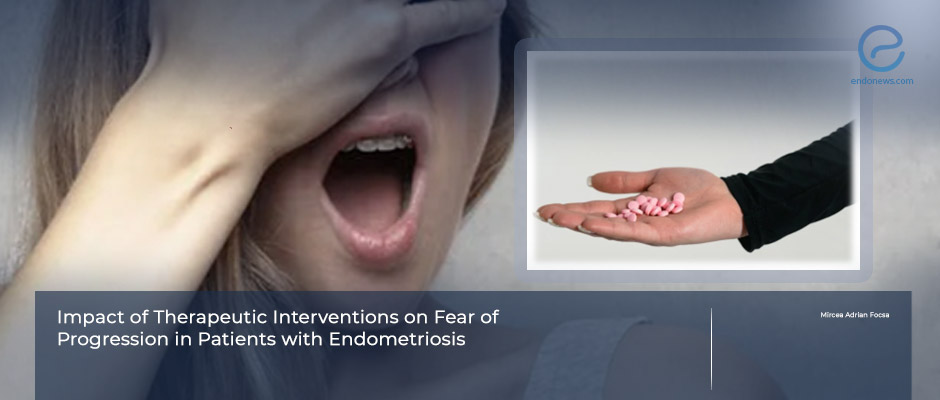Fear of Progression in Endometriosis: The Role of Treatment Approach
Sep 18, 2025
Exclusive Hormonal Therapy Heightens Fear of Progression in Women With Endometriosis, Study Finds
Key Points
Highlights:
- Women treated with hormonal therapy alone reported the highest fear of disease progression (FoP) compared to those who had surgery or were awaiting surgery.
- Surgical management was associated with the lowest FoP scores, highlighting treatment approach as a key determinant of psychological burden.
Importance:
- Psychological support should be a key part of a multidisciplinary approach to endometriosis management, particularly for patients relying on hormone-only therapy.
What’s done here?
- A prospective survey was conducted in 298 adult women with histologically confirmed endometriosis.
- Participants were divided into four treatment groups:
- Hormonal Therapy Only
- Hormonal Therapy + Planned Surgery
- Primary Surgical Management
- Phytotherapy/Alternative Therapy
- The Fear of Progression Questionnaire–Short Form was used, a validated tool for chronic diseases.
Key results:
- A total of 298 women who met the eligibility criteria was included in this prospective survey.
- The overall level of fear of progression was high across all groups, with a median score of 4 out of 5 for the entire study population.
- Patients in the hormonal therapy only group had the highest mean FoP score, while the surgical management group had the lowest.
- Even after adjusting for age, the differences between the groups remained significant, confirming that hormone-only therapy is associated with greater anxiety about disease progression.
- Younger age was found to be a significant factor associated with increased fear, with younger patients consistently reporting higher FoP scores.
Strengths and Limitations:
- The use of a validated tool (FoP-Q-SF) to quantify a recently recognized psychological dimension in endometriosis; and the prospective design with a relatively large cohort enhances reliability are the strengths of the study.
- Limitations are cross-sectional design that prevents causal inference and no longitudinal follow-up was available to assess how FoP changes over time, not assessment of key clinical variables such as pain severity, stage of disease, pre-existing mental health.
From the Editor-in-Chief – EndoNews
"This study exposes an often overlooked but clinically significant burden of endometriosis—the fear of progression. While surgery and combined treatment approaches appear to temper this anxiety, women relying solely on hormonal therapy are left with heightened uncertainty about their disease trajectory. The finding that younger patients are particularly vulnerable underscores the psychological toll that endometriosis exerts early in life.
Importantly, this is not just a theoretical observation. Fear of progression is a validated construct in chronic illness, linked to impaired quality of life, treatment dissatisfaction, and even reduced adherence to medical regimens. By documenting its presence in endometriosis, the authors bring a crucial psychosocial dimension into focus.
The clinical message is clear: managing endometriosis requires more than symptom control or surgical precision—it requires systematic psychological support. Integrating validated tools like the FoP-Q-SF into clinical practice could help identify patients at highest risk and ensure timely mental health interventions. Future longitudinal studies must track how fear evolves across different treatment pathways and whether targeted psychosocial support can mitigate its impact.
In short, the work highlights that effective endometriosis care is not only about preventing recurrence—it is equally about preventing despair."
Lay Summary
Endometriosis is a chronic condition that causes pain, infertility, and a range of mental health challenges, including anxiety and depression. A particular form of anxiety, known as fear of progression, reflects the worry that the disease will worsen over time. This fear can lead to insomnia, fatigue, and disruptions in daily life.
A recent study by Dr. Focsa from the Department of Medical Informatics and Biostatistics of Victor Babes University of Medicine and Pharmacy Timisoara, Romania, published in the Journal of Clinical Medicine under the title “Impact of Therapeutic Interventions on Fear of Progression in Patients with Endometriosis”, examined how different treatment approaches influence fear of progression.
The study found that women treated with hormonal therapy alone reported the highest levels of fear that their disease would progress. In contrast, women who had undergone surgery or were scheduled for surgery tended to feel less anxious. This suggests that having a clear treatment plan—particularly one that includes surgery—may provide patients with a greater sense of control and reassurance than hormonal therapy alone.
Another important finding was that younger women consistently reported higher fear of progression than older women, regardless of treatment type. This may reflect greater concern about the long-term effects of endometriosis on fertility, relationships, and career plans.
These results highlight the importance of a comprehensive, multidisciplinary approach to care. Alongside medical and surgical management, psychological support should be systematically offered to help women manage their fears and improve overall quality of life.
As the authors note, “By recognizing and addressing the fear of progression, we can provide truly patient-centered care aligned with the principles of personalized and humanistic medicine in endometriosis.”
Research Source: https://pubmed.ncbi.nlm.nih.gov/40429320/
endometriosis fear of progression anxiety hormone therapy surgery

